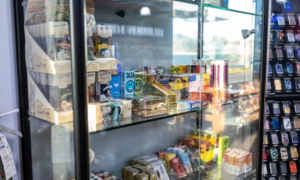Navigating The Vape Industry: An Interview With Deanna Clark-Esposito of Clark-Esposito Law Firm P.C.

Check out Deanna Clark-Esposito LIVE during CHAMPS Atlantic City
From local and state regulations to federal and international rules, these days navigating the legal vaporization landscape is a nightmare. Enter Deanna Clark-Esposito of Clark-Esposito Law Firm P.C. out of New York, New York. We sat down with Deanna to talk about the legal landscape and how retailers should best prepare their businesses for future success.
Also, make sure to check out Deanna Clark-Esposito LIVE during CHAMPS Seminar Series at CHAMPS Atlantic City in room 310 May 22nd from 2pm to 3:30pm EST.
MRR: Why don’t we start will telling us a little bit about who you are.
Deanna Clark-Esposito: Okay, excellent. I’m the managing attorney of the New York City based Clark-Esposito Law Firm, P.C. Here we provide legal representation to domestic and foreign companies with matters involving US federal laws and agencies including the US Food and Drug Administration, FDA, on vape and tobacco products, US customs on imported goods, and then with respect to the Department of Commerce, DIS, and the Office of Foreign Assets Control, OFAC, on exports. I’m also part of the Board of Directors to SFATA, which is the Smoke Free Alternative Trade Association.
I’ve taught several courses related to vapor products. Earlier this year, I taught an online course entitled a beginners guide to vape and e-cigarette law that was done with the company called myLawCLE. Last year, in 2018, I presented at CHAMPS in Las Vegas. I presented on vape and CBD legalities. A primer for retailers, manufacturers, and importers. I also taught an online class with LawLine.com entitled Legal Compliance for the Vape and E-Cigarette Industry.
Apart from that, I was invited to speak at Yale University. Their business school had their first ever Business of Legal Cannabis conference last year. In 2017, I presented at the Vapor Fair Meets Hookah Fair trade show. Just providing an overview of current obligations, deadlines, and what’s on the horizon for the vape industry in terms of FDA regulations and compliance. I’ve also been a panelist at a women grow New York City event called Know the Law, the Legal Side of a Cannabis Business.
Separate from presenting, I do have a legal editorial column with B2B Wholesaler Magazine, and it’s actually a column called Ask Deanna where folks can send in questions related to legal or business questions about the vape industry. Then, I do my best to answer them.
MRR: Nationwide now, we’re dealing with a movement attempting to raise the smoking age to 21. What is the current landscape for tobacco looking like in the United States, and what should retailers be prepared for?
Deanna Clark-Esposito: Retailers should really be prepared for a couple of different things with the first being a lot more inspections. With all of the potential changes, the states are gearing up. If there are changes, there’s always quite a bit of enforcement certainly at the outset. Retailers want to be sure that they’ve got their retailer training and compliance programs in place. That’s actually something I plan to go into a bit at the CHAMPS Seminar Series tomorrow.
The FDA for example, they have a different schedule of penalties where you have what they consider an approved retailer training program versus one that’s not approved. Of course, the wonderful FDA hasn’t given us what an actual approved one looks like, but they provided guidelines, and then based on that … my firm, we’ve actually crafted retailer training programs and manuals. I want to share some of the best practices at this seminar.
The flavor ban E-21, FDA had already announced that they had intended to increase their underage buys. I forget the term they use for that program, but they indicated they would be increasing enforcement via that program and hiring more people to try and make purchases. We see their warning letters coming out every week. To just general, often times convenience stores, chains, and then of course the occasional bake shop. The bake shops are much more responsible parties in all of this typically than our friends at the convenience stores. But that would be one thing.
Another thing is really getting the identification age, identification requirements down. There are companies like E-Cig Intelligence. Of course a lot of people are using e-verify to verify age, but that’s really something that’s being looked at as well and the technology behind that. I see retailers specifically needed to really sort of make sure that that is all in order so they don’t have any incidents of sales to use. Because we see with the T-21 movement across the country, age matters, keeping access out of the hands of youth matters. Whether that’s really online or in store, that’s a huge issue.
Actually, another thing I plan to talk about are what FDA has proposed as it’s new policy which they’re debating if they’ll do. In that proposed policy, they go ahead and explain how they intend to look at enforcement, and they’ve prioritized how they want to do their enforcement. They plan to target products that are likely to promote the use of vapor products, they call them ENDS of course, Electronic Nicotine Delivery Systems, by minors or that are actually targeted to minors. Of course retailers who have things that do seem kid friendly, they should seriously consider no longer purchasing those from their distributor, and if they’re mixing in shop and then they’re doing their own labels, and it’s something that could be kid friendly or kid appealing, they should go ahead and change that as well because they’re really going to be cracking down on that.
They’re also looking at online. I know I’ve gone to sites, and of course the age thing pops up, but you can just click right around it and go right into the store.
MRR: How would an online retailer be able to fight against that and be able to secure their business or to ensure compliance on a federal level?
Deanna Clark-Esposito: Well, what they need to do is, A, they need to get their web administrator, pay the extra money to actually get it so that the age has to go in, and I’ll explain why in a minute. Then separate from that, they want to use age verification techniques. I’ll tell you I’ve had clients who have gotten creative to where it’s not only sufficient to send an ID. They actually have gone and done a Facebook Live to see that they’re really the person. Online retailers need to get creative to ensure that they’re confirming the age of online purchasers.
That can be done in several ways. Obviously, you probably never would have thought about a Facebook live to have an age verification. Right? I know. But I’m glad the client did that. They have had concerns and because of creative innovation they were able to confirm within reason, okay, this actually is somebody of age. Part of why I mention that it’s important just to even have your website correct has to do with the following. Penalties can arise with a government agency as a result of a failure to exercise due diligence over your own operation. The reason why the agencies, and this is all government agencies, FDA included of course, but they want to see that you’ve got written, documented policies and procedures that you follow in your day to day operations, and that you’ve trained your staff on how to use that.
Whenever I’m looking at a company, part of it is, okay, here’s what you do to be compliant, and then the other part of that is here’s what you do to look good because even just having your paperwork in order can work in your favor. Where, for example, if penalties are issued, they can work as a mitigating factor. Oh, this company was not only very helpful, but they provided us with everything. Everyone can have everything in their head, and know what to do. But the government can’t sit down and interview everybody to pull out of their brain how the systems operate. Instead, they want you to just be able to hand over your FDA compliance manual in the case of FDA. It’s customs related because we have a lot of imports of e-cigarettes that are coming in. Have all of your records and compliance manuals lined up. These are some of the things I plan to talk about. CPSC came out with a new requirement on bottles containing nicotine, or at least they finalized where they were going with it. I want to talk about that a little bit as well. I actually have some questions on that I’ll be answering for the June addition of the B2B Wholesaler Magazine. The May addition which we’ll have Champ show actually goes through FDAs new proposed compliance policy on vape products. Part of what I’ll be going over, folks at the show can actually go over to the B2B Wholesaler Booth and pick up a copy. I’ll be over there doing a legal Q&A in the afternoon, and so anybody at the show’s welcome to come over and talk to me about any business or legal issues that they may be facing.
MRR: Can you talk about what the laws are surrounding CBD currently, and what retailers are actually allowed to do.
Deanna Clark-Esposito: Yeah. I’ll answer that in the following way because this is what I discussed at CHAMPS last year and had to do with the sources of cannabis law as it currently was last year. I think really the only difference now is that we had the December bill that went through for industrial. Now it’s interesting. Now we have this industrial hemp, but that is still requiring plants to be grown under that program. Maybe now that we are in May something’s been grown under that, but basically everything else in the marketplace hasn’t been.
Because of that, it throws us back into the other law. The other law left us with cannabis not legal at the federal level. The way that the fence got around that was that in their appropriations bill, which is where they allocate money to the different agencies, they looked at money being given to the US Department of Justice, and they simply said that no part of your budget may be spent on … and they would list the different states in relation to medical marijuana. They then, and that’s how they dealt with it. Okay, it’s not that everything’s fine with medical. Simply you guys can’t spend any money enforcing it.
Of course what we had had until January of last year was the department of justice’s policy under the Cole Memorandum. The Cole Memorandum looked at the department of justice’s budget and how they were going to spend it, how they were going to prioritize enforcement. Which said where companies are operating lawfully within their state’s legals framework in relation to cannabis, we are not going to bother those companies, and we’re not going to do that because our primary concerns have to do with violent, drug related activity. Moms making CBD lotion in their kitchen, they’re just not a priority, right?
State by state, they’ve been taking that approach differently. I think any seller in a state like, well, let’s start with New York. New York, we have very little by way of what is even permissible under our medical. I think last time I checked, and this was a year ago, we had only 15 conditions that qualified to obtain medical. I’m a native San Franciscan. I understand we’ve had medical since the ’90s. I remember that, and it was normal. Everybody has the card today.
“Oh, my friend has a card. They’ll get something.” That approach to obtaining cannabis isn’t quite the same here in New York because we don’t have essentially a generation now of people living with that. I see retailers carrying a lot products containing CBD and honestly, I don’t see a whole lot of enforcement. You contrast that against a state like California because we don’t have adult use here either. There’s no such thing as recreational. Then, you’ve got states like California where it seems from the outside like you have a lot more freedom. Certainly people seem to have a lot more freedom, but then you’ve got your local level challenges which are arising whether it’s in relation to, okay, we’re not going to give you your license anymore. This permit expires, and you can’t get a new one, or we’re just gonna deny you in general because they’ve all been used up. Whatever the case may be. Then of course in terms of sales, there may be a restriction in one county that just isn’t applicable in another, but you didn’t know that when you entered into your ten year lease when everything was unclear, and now it’s impacting you in this way. I think as retailers carrying CBD products, retailers need to be very careful about the products that they’re buying, and to the extent that they’re able to now look to obtaining hemp grown under or CBD derived from hemp grown under this new law, they really want to pay attention to the traceability of the origin
MRR: I believe New York City has clamped down on CBD additives in restaurants. Can you talk about that a little bit?
Deanna Clark-Esposito: Oh, absolutely. So the FDA … Essentially, the when the president signed the Farm Bill, and I think it was actually later that day, the FDA came out with it’s own announcement saying, “This is still under Federal jurisdiction and remains a schedule one drug. It has not been approved as a food or as healthy or safe rather for human consumption. It can not be in food.” Then the states, very quickly actually, came around and said okay no more CBD. Because we had a lot of tea shops, cafes, with CBD in it, and very quickly at the beginning of the year on the news there were different restaurants and they were showing signs, “No more CBD coffee and no more CBD cake,” et cetera. Because it hasn’t been deemed it’s safe for human consumption by the FDA.
MRR: Deanna thank you so much for your time and we look forward to listening to your seminar tomorrow during CHAMPS Atlantic City!
Deanna Clark-Esposito: Thank you!
To check out Deanna at CHAMPS, make sure to listen to the seminar “Navigating the Vape Industry – FDA Compliance for Importers, Manufacturers, and Retailers” tomorrow in Room 310 at CHAMPS Atlantic City.


































